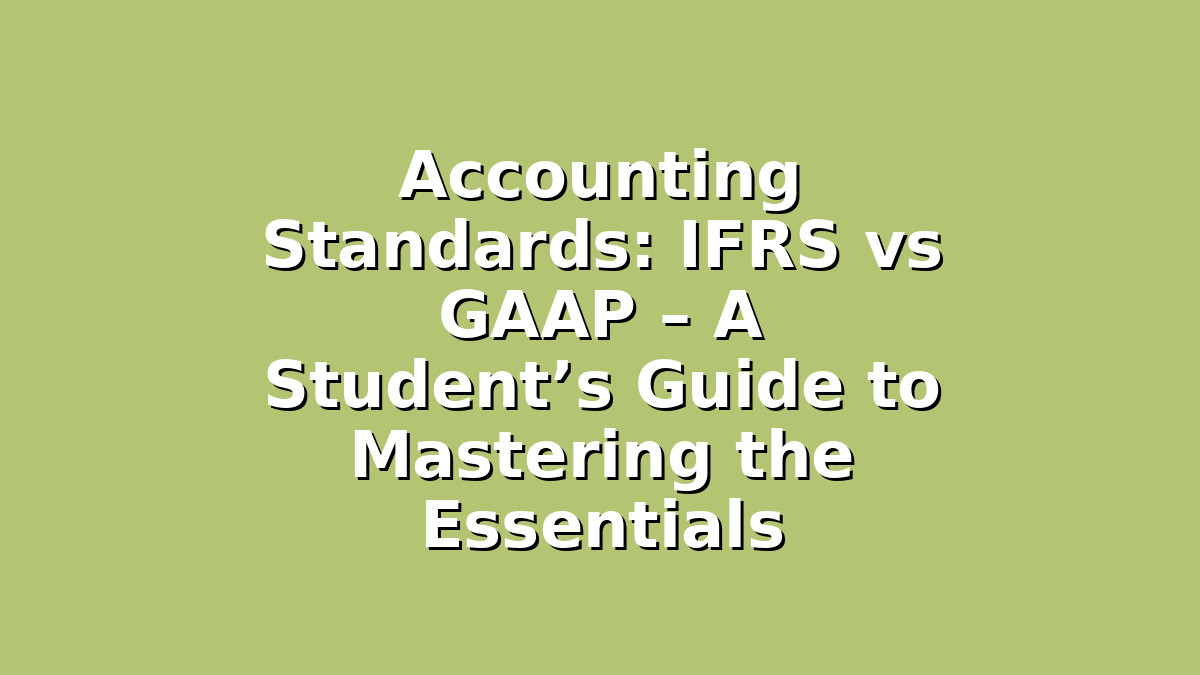Introduction
If you’re a student preparing for exams in accounting or finance, understanding accounting standards is essential. Two of the most important frameworks you’ll encounter are IFRS (International Financial Reporting Standards) and GAAP (Generally Accepted Accounting Principles). Both play a crucial role in how companies report their financial information, but they differ in significant ways.
Mastering these standards can sometimes feel overwhelming, especially when exam time is near. However, with the right strategies and a clear understanding of the differences and similarities, you can confidently tackle questions related to these accounting frameworks. In this article, we’ll break down IFRS vs. GAAP in a student-friendly way and provide practical study tips to help you excel.
Section 1: Understanding IFRS and GAAP – What You Need to Know
Before diving into study tips, let’s clarify what IFRS and GAAP really are.
– IFRS (International Financial Reporting Standards) is a set of accounting rules developed by the International Accounting Standards Board (IASB). It is used by more than 140 countries worldwide, including most of Europe, Asia, and others. IFRS aims to provide a global standard, making financial statements more comparable across international borders.
– GAAP (Generally Accepted Accounting Principles) refers to the accounting rules and standards used mainly in the United States. These principles are established by the Financial Accounting Standards Board (FASB) and provide detailed guidance on how companies should record and report their financial activities.
Key differences include:
1. Rules vs. Principles: GAAP is considered more “rules-based” with detailed guidance, while IFRS is more “principles-based,” offering broader guidelines that require interpretation.
2. Inventory Methods: GAAP allows Last-In-First-Out (LIFO) inventory accounting, but IFRS does not.
3. Revenue Recognition: IFRS and GAAP have converged somewhat in revenue recognition standards, but differences still exist in some application areas.
4. Development Costs: Under IFRS, certain development costs can be capitalized; under GAAP, they are generally expensed.
For students, understanding these distinctions helps you answer exam questions thoughtfully and explains the rationale behind accounting treatments.
Study Tip: Create a comparison chart for IFRS and GAAP. Visual aids help you quickly recall differences and improve retention. Include examples from your textbooks or class notes to see how theories apply in practice.
Section 2: Effective Study Techniques for Accounting Standards
Accounting standards require precision and detail, so your study approach matters. Here are some proven techniques:
1. Active Reading and Note-Taking
Read your accounting standards textbooks or notes actively. Don’t just highlight—summarize key points in your own words. For IFRS and GAAP, focus on the core principles, exceptions, and examples. Creating your own summaries helps you internalize the information instead of memorizing blindly.
2. Use Past Exam Papers and Practice Questions
Most accounting exams include scenario-based questions comparing IFRS and GAAP treatments. Practice with past papers and question banks to familiarize yourself with typical formats. When you answer, explain why a certain treatment applies under IFRS but not GAAP (or vice versa). This will deepen your conceptual understanding.
3. Form Study Groups
Discussing accounting standards with peers can clarify confusing points. Study groups allow you to quiz each other on differences and application. Teaching a concept to someone else is one of the best ways to remember it.
4. Apply Real-World Examples
Look up real companies’ financial statements and identify where IFRS or GAAP rules are applied. This practical approach bridges theory and practice, making abstract concepts more concrete.
Study Tip: Schedule short, focused study sessions (25-30 minutes) on specific standards, followed by quick review breaks. The Pomodoro Technique can boost concentration and reduce burnout.
Section 3: Tackling Exam Questions – Strategies for Success
When exam day arrives, how you approach IFRS vs. GAAP questions can make all the difference. Here’s how to maximize your score:
1. Read Questions Carefully
Exam questions may specify which standard to apply or ask you to compare both. Highlight keywords and jot down what the question requires before starting your answer.
2. Structure Your Answers Clearly
Use headings or bullet points where possible. For example, if asked to compare revenue recognition under IFRS and GAAP, write separate sections for each, then a final comparison. Clear organization shows the examiner your understanding and makes grading easier.
3. Explain ‘Why’ and ‘How’
Don’t just state the difference; explain why the treatment differs and how it impacts financial reporting. This deeper insight impresses examiners and demonstrates mastery.
4. Use Accounting Terminology
Incorporate technical terms correctly, such as “capitalization,” “expense recognition,” “fair value measurement,” or “matching principle.” Using industry language appropriately reflects your professionalism.
5. Manage Your Time
Allocate time based on marks assigned to each question. Don’t get stuck on one question at the expense of others. If you’re unsure, write down what you know and move on—partial credit is better than none.
Study Tip: Practice writing full-length answers under timed conditions before exams. This builds your confidence and improves your ability to recall information accurately and quickly.
Conclusion
Accounting standards like IFRS and GAAP are fundamental for anyone pursuing accounting, finance, or business studies. While the differences can seem daunting, breaking them down into manageable pieces and using effective study techniques will help you master the material. Remember to stay consistent, actively engage with the content, and apply your knowledge through practice.
You’ve got this! With dedication and the right approach, you’ll confidently handle IFRS and GAAP questions and perform well in your exams. Keep reviewing, stay curious, and don’t hesitate to seek help from instructors or peers when needed.
Good luck with your studies!

Responses